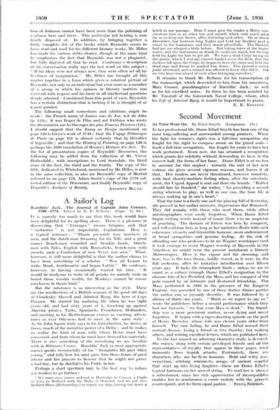Ramblin' Jack. The Journal of Captain John Cramer, 1700-1774. Edited
by R. R. Bellamy. (Cape. is. 6d.)
A Sailor's Log
IT is scarcely too much to say that this book would have been delightful for its spelling alone. There is a pleasure in discovering that " feeteages " means fatigues, and that " `iaslaereoe " is not improbably Cephalonia. Here is a typical .sentence : " Theair presently rose numbers of men, and the dutch-man Swearing for his Nife, and a great
[Haney french-men wounded and broakin heads. Dutch- men with Nifes, English with Brun:sticks, french-men with swords, such a Confushon of men Never was seen." What, however, is still more delightful is that the author claims to have been something of a scholar. " Wee all Learnt to write, Read, Arrithmattic and begun Lattin." He confesses, however, to having occasionally wasted his time. " It
would be- teadyous to- write of all pranks we naturly took on board those woodin worlds, for Monkeys cannot be moore
nasal:is-us in theair kind."
But the substance is as interesting as the style. These are the recollections of a British seaman of the good old days of CloudesIey Shovel and Admiral Byng, the hero of Cape Passatro. He started his seafaring life when he was eight years old, and had sixty years of it, knocking up against Algerine pirates, Turks, Spaniards, Frenchmen, Hollanders, and meeting in his Mediterranean cruises as exciting adven- ture:4 as evet Odysseus had to Meet in the sante wate- As Sir John Squire truly says in his Introduction, he shows, at times, Much of the narrative power of a Defoe ; and he makes us realise the kind of man with whom Defoe must have conversed, and from whom he must have derived his materials. There is also something of the moralising we are familiar with in Robinson Crusoe. Hamblin' Jack (a most appropriate name) speaks remorsefully of his " thoughtles life past "when
young," and tells how his aunt gave -him three hours of good advice and her prayers to heaven that he might not prove
a bad boy, but he dutiful. to his tznkle-in-law.
Perhaps a Short Specimen may be the best way to induce oar readers to go further : •
"We ware once r000re ordered to Haraidge to Convoy a Cuple of Vats to Rolland with the Duke of Ormond, and we put into Uelford Slue° (Helvoetaluys) to repair our ship, having run down a ketch in our passage. Hear I must give the reader a Merry mis- cheafous turn in an other boy and myself, which with much adue for us to keep our Secret, often thretning each other. On or about December, but however king Nights and Coldour Dockter paid a viaset to the boatswain, and theydrank plentifully. The Dockter had got me wheped a little before. But taking leave of the boats. waine, and the boatswain° se drunk he could not stand, but his boy held his Light for him to get aft. We had a dead Corps laying on the gra-tin, which I and my concert hauled acros the deck, that the dockter fell upon the Corps, he began to beat the corps and held the dead man and Swear he pushed him down. This proved a merry joake afterward, and a reward was offered to know who did it. Soe we two boys was afraid of each other betraying ourselves."
It remains to thank Mr. Bellamy for his transcription of the manuscript, which descended to him-from his ancestress, Mary Crerner, granddaughter of Rm.:1MM' Jack.; as well as for his excellent notes. In these he has been assisted by Mr. Tunstall of the Greenwich Naval -College, whom, after his Life of Admiral Byng, it would be' Impertinent to praise.
E. E. liam.orr.














































 Previous page
Previous page